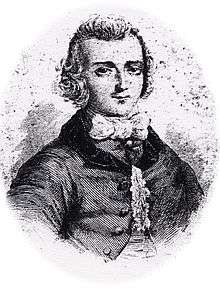Louis de Jaucourt
| Louis de Jaucourt | |
|---|---|
 | |
| Born |
16 September 1704 Paris, France |
| Died |
3 February 1779 (aged 74) Compiègne, France |
| Nationality | French |
| Occupation | Physician, philosophe, writer |
| Known for | Encyclopédie |
Chevalier Louis de Jaucourt (French: [də ʒokuʁ]; 16 September 1704 – 3 February 1779) was a French scholar and the most prolific contributor to the Encyclopédie. He wrote about 18,000 articles on subjects including physiology, chemistry, botany, pathology, and political history, or about 25% of the entire encyclopaedia, all done voluntarily.[1] In the generations after the Encyclopédie's, mainly due to his aristocratic background, his legacy was largely overshadowed by the more bohemian Denis Diderot, Jean-Jacques Rousseau and others, but by the mid-20th century more scholarly attention was being paid to him.
Biography
Jaucourt was born in Paris. He studied theology in Geneva, natural sciences at the University of Cambridge, and medicine in Leiden. Upon returning to France, he spent the next 20 years writing the Lexicon medicum universalis, a six-volume work on anatomy. He sent it to be published in Amsterdam to avoid French censorship but the ship carrying the sole manuscript sank, and 20 years of labour was lost. He also wrote a biography of Leibniz.[2]
He volunteered to work on the Encyclopédie, recruited by publisher Michel-Antoine David starting with the second volume of the work. He began modestly, with only a few articles in each of the next several volumes, but gradually became more and more involved. Between 1759 and 1765 he wrote on average 8 encyclopaedia articles per day, for a total of 17,266 out of 71,818 articles (or about 25%), making him by far the single most prolific contributor to Encyclopédie. His contributions come to some 4,700,000 words. He was especially active in the later volumes, writing between 30% and 45% of the articles in volumes 10 to 17. This earned him the nickname l'esclave de l'Encyclopédie (the slave of the Encyclopedia).
Unlike other editors, Jaucourt was independently wealthy and asked for no payment for his full-time labours. Most of his works consisted of summarising full books and other longer works into encyclopaedia articles, with much content copied verbatim from existing sources. He employed a group of secretaries, out of his own pocket, to help with the effort. He wrote mainly on the sciences, especially medicine and biology. He took a firmly mechanist approach to the subject. This is in sharp contrast to the other major contributor in this area, Ménuret de Chambaud, who had a firmly vitalist view.
While his main focus was on science and biology, he also covered a wide array of other subjects. It is in his works on history and society that his political and philosophical views become clearly evident. He wrote articles of central importance on war, monarchy, people, and Muhammad. His writing is never as openly political as other contributors such as Diderot and Voltaire, but it is clear that he possessed deeply held views. Some of his works, such as those on historical subjects clearly contain radical and anti-clerical messages through implied comparisons between the ancient past and modern France. de Jaucourt also criticized Divination and superstition, following Francis Bacon in interpreting superstition primarily as an intellectual error.[3] He also did important works on slavery, the slave trade, and black people, all strongly condemning slavery as counter to both natural rights and liberties.
Jaucourt practised medicine and was a Fellow of the Royal Society in London and member of the academies of Berlin, Stockholm (elected a foreign member of the Royal Swedish Academy of Sciences in 1756), and Bordeaux. He died, aged 74, in Compiègne.
References
- ↑ Frank A. Kafker: Notices sur les auteurs des dix-sept volumes de « discours » de l'Encyclopédie. Recherches sur Diderot et sur l'Encyclopédie. 1989, Volume 7, Numéro 7, p. 144
- ↑ published with the pseudonym of L. de Neufville, Histoire de la vie, et des Ouvrages de Mr. Leibnitz, Amsterdam, 1734
- ↑ Josephson-Storm, Jason (2017). The Myth of Disenchantment: Magic, Modernity, and the Birth of the Human Sciences. Chicago: University of Chicago Press. p. 53. ISBN 0-226-40336-X.
Sources
- Philip Blom, Enlightening the World: Encyclopédie, The Book That Changed the Course of History, London, Palgrave Macmillan, 2005.
- Luigi Delia, "Crime et châtiment dans l'Encyclopédie. Les enjeux de l'interprétation de Montesquieu par de Jaucourt", in "Dix-huitième siècle", n. 41, 2009, pp. 469–486.
- James Doolittle, "Jaucourt's Use of Source Material in the Encyclopédie", Modern Language Notes. Vol. 65, No. 6. The Johns Hopkins University Press, June 1950.
- Frank A. Kafker, "The Recruitment of the Encyclopedists", Eighteenth-Century Studies Vol. 6, No. 4. The Johns Hopkins University Press, Summer, 1973.
- Richard N. Schwab, "The Extent of the Chevalier de Joucourt's Contribution to Diderot's Encyclopédie", Modern Language Notes. Vol. 72, No. 7. The Johns Hopkins University Press, Nov. 1957.
External links
- (in French) L'Encyclopédie de L'Agora